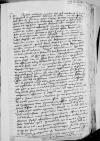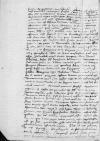Deus meliorem mentem det istis tabellariis, quam habuere hactenus in perferendis litteris tuis et meis, vix enim quinque dies sunt, ex quo ⌊⌋ accepi ⌊Viennae⌋ de data tricesimae, ni fallor, aut vicesimae nonae Decembris, neque tamen in obscuro esse potuit, ubi ego fuerim, quando ⌊Foccharis⌋ et ⌊Welzeris⌋ id omnino constitit, et imprimis vestratibus. Gaudeo itaque vehementer te vivere et valere, quantumvis nonnihil officiat dexteri pedis dolor, quem levius tolerare te scribis, quam nullum in externis curis, qua in re vehementer tecum assentior. Quod autem miraris me nihil scripsisse, omnino arbitror tibi satisfactum cum tempore esse, nam antea non vacabat in rerum omnium desperatione gravissimisque itinerum periculis, quibus demum ereptus sum, cum ex ⌊Mantua⌋ venissem ⌊Oenipontem⌋. Tristissimam rerum, quam tibi depinxi, faciem talem omnino esse arbitrare, neque tamen desinimus caeci esse. Ego vero, ut bonum nuntium ad te scribam, ad has fortunas occallui neque curo amplius, sed spem posui in Deum.
⌊Uxor⌋ feliciter peperit,[1] prout scripsi. Non omnia perdita sunt. Adhuc domi est, quod me alat.
Offeruntur undique condiciones, tum ex ⌊Francia⌋, prout aliquoties ad te ⌊⌋, tum ab aliis, non sine scitu ⌊caesaris⌋, cui ea exposui et expono per litteras. Praeterea nunc versor in hac legatione ut minime utili, quae tamen mihi pariat experientiam et cognitionem aliquantam istarum rerum. Id vero satis arbitror esse. In summa usque ad extremum sum permansurus in officio boni viri, quem si ⌊caesar⌋ alere vel ab ignominia meorum vindicare nolit, feram aequo animo et, postquam reipsa ostendero per me nihil omissum esse, respiciam vel postliminio ad res meas. Neque non possum maximas tibi gratias agere, quod talem te obtuleris futurum, qualis hactenus fuisti, neque parvae gloriae loco duco, quod in inclito vestro ⌊regno⌋, si omnia apud nos pereant, offeruntur a clarissimis viris ⌊Pzremisliensi episcopo⌋, illustri domino ⌊Ioanne comite a Tarnovia⌋, qui me prior litteris suis amicissimis ad amicitiam provocavit, amicorum officia, quae eo sunt gratiora, quod ab integerrimis viris sincerissimoque affectu profecta sciam. Nolo tamen diffiteri ad neminem me libentius venturum esse, quam ad te, si casus aliquis acerbior ingrueret, secundum te ad eos. Sed haec Deus meliora faciet. Quare desine mea causa dolere et temet cum dulcissima ⌊matre⌋, amicissimis ⌊sororibus⌋, affinibus et amicis oblectare, quibus officiosissime cupio commendare, et ad me aliquando scribe. Sciet enim ⌊reverendissimus Pzremisliensis⌋ aut ⌊Karolus Coczer⌋ litteras ad me tuas, aut ⌊Focchari⌋ transmittere.
⌊Reverendissimus dominus Lundensis⌋ et ego hic sumus ⌊Viennae⌋ in commissione nostra. Fuimus ⌊Posonii⌋ in ⌊Hungaria⌋ per aliquot dies ibi tractantes cum ⌊oratoribus⌋ illustris ⌊domini Ioannis comitis Scepusiensis⌋, viris certe insigni eruditione et prudentia praeditis. Magnificum tamen dominum ⌊Hieronymum de Lasko⌋, qui
unus
fuerat ex quattuor, non vidimus, abierat enim rediturus, nisi conventus interruptus fuisset. Cuius causa haec fuit, quod dum ⌊illic⌋ tractaremus, advenit nuntius ⌊caesaris Thurcarum⌋ ad ⌊Ferdinandum regem⌋ missus pacem ferens honestissimis immo nullis condicionibus aliis, nisi indicibus valde magni timoris. Qui unde emergat, non est obscurum divinare, ex damnis scilicet acceptis et ex offirmatione omnium in ⌊Styria⌋ ⌊Carinthia⌋que, et finitimis provinciis incolarum, apud quos multum perdidit aestimationis nomen Turcicum, aliquot modis tentatis, nulla re bene gesta. Quod affirmare nisi sciremus, ⌊reverendissimus dominus Lundensis⌋ et ego, non essemus adhuc tam affecti in eam, quam debemus, partem, in quam nos honestum est, ut simus affecti, quam nunc scribimus. Itaque certum habe a nobis pacem a ⌊Thurcarum caesare⌋ non tam offerri, quam peti, solidam illam et citra indignitatem cuiusquam, quod ideo dicimus, quia sparguntur et in ⌊Hungaria⌋, et in ⌊Polonia⌋ rumores, quod ⌊pontifex⌋ et ⌊caesar⌋ in hanc consenserint pacem, quae esset, ut ⌊Ferdinandus⌋ regnum teneret ⌊Hungariae⌋, daret ⌊Thurcis⌋ ⌊Sclavoniae⌋, bassas sibi largissimis donationibus devinciret. Quod omne falsum est, nam ne unus quidem pes terrae in ⌊Hungaria⌋, ⌊Sclavonia⌋ aut aliis provinciis datur ⌊Thurco⌋ neque quicquam bassis aut tributi nomine, aut largitionis, neque pro ipso quidem ⌊ Hungariae regno⌋ tribuitur. Tantum manet aequalitas et amicitia, paxque vita ipsorum durante, prout moris esse ⌊Thurcarum⌋ tute nosti. Cum ⌊caesare⌋ nostro et ⌊ille⌋ pacem ambit, quam tamen in tempora dividit, sed ita longa, ut interim sit vel dominus, vel asinus moriturus.
Hoc tantum potuimus scripsisse. Exspectamus responsum a ⌊caesare⌋, pro quo missus est illustris ⌊comes de Salm⌋. Econtra ⌊vayvoda⌋ misit ⌊Ludovicum Griti⌋ ad instantiam ⌊caesaris Thurcarum⌋ pro re sua. Quid sit facturus, nescimus. Hoc scimus pacem firmam et solidam esse, cuius causa haec est. Cum semper vayvodani dixerint ⌊Thurcarum caesarem⌋ nihil, nisi totum ⌊Hungariae regnum⌋ daretur ⌊vayvodae⌋, voluit experiri id serenissimus ⌊Rhomanorum rex⌋ atque ob id post fugam ⌊Thurcarum caesaris⌋ ex ⌊Pannonia⌋ aut, si mavis, fugae similem discessum, missus est quidam, qui animos invenit praeparatos praefati caesaris. Obtulitque illa, quae a tam magni habito ⌊principe⌋ nemo exspectasset, nisi qui sciret, quantum esset, quod nobis esset formidandum, quod plurimis videtur esse valde exiguum.
Nos ad haec pauca Dominationi Tuae Reverendissimae commendamus et felicissime valere eandem exoptamus. ⌊Campensi⌋ paucis scribo, quia non suppetit tempus in istis gravissimis negotiis.
Deus te conservet incolumem cum tuis omnibus. Sororio tuo, tametsi amicorum et fratrum nomine eum prius comprehenderim, meo nomine plurimam salutem dicito, quia, quod et ille se mihi commendaret, scripsisti. Et bene vale, Domine et Amice, et Pater vere amate, et Deus te conservet. Si non tam brevi, semel tamen conveniemus, ubi
cf. Vulg. Apc 2:23:3 dabo unicuique vestrum secundum opera vestra; Vulg. Apc 20.14.4-5 et iudicatum est de singulis secundum opera ipsorum; Vulg. Apc 22.12.1-2 ecce venio cito et merces mea mecum est: reddere uniciuque secundum opera sua; Vulg. Rm 2:6:1 qui reddet uniciuque secundum opera eius; Vulg. Ier 25.14.2 et redam eis secundum opera eorum; Vulg. Ecl 35.25.1-2 donec reddat hominibus secundum actus suos et secundum opera Adae; Vulg. Ps (G) 27.4.1 da illis secundum opera ipsorum; Vulg. Ps (G) 27.4.3 secundum opera manuum eorum tribuet illis ⌊Deus redditurus est unicuique secundum opera suacf. Vulg. Apc 2:23:3 dabo unicuique vestrum secundum opera vestra; Vulg. Apc 20.14.4-5 et iudicatum est de singulis secundum opera ipsorum; Vulg. Apc 22.12.1-2 ecce venio cito et merces mea mecum est: reddere uniciuque secundum opera sua; Vulg. Rm 2:6:1 qui reddet uniciuque secundum opera eius; Vulg. Ier 25.14.2 et redam eis secundum opera eorum; Vulg. Ecl 35.25.1-2 donec reddat hominibus secundum actus suos et secundum opera Adae; Vulg. Ps (G) 27.4.1 da illis secundum opera ipsorum; Vulg. Ps (G) 27.4.3 secundum opera manuum eorum tribuet illis ⌋. Sacerdotium tuum gratum habeat, qui pro nobis passus est et in quem speramus. Aliquando memineris precibus tuis nostri. ⌊Uxor⌋, ⌊frater⌋[2] et amici se tibi commendant, quia putabant me in ⌊Poloniam⌋ profecturum. Sed haec ego per litteras.
⌊Caesar⌋ est ⌊Alexandriae⌋ traiecturus in ⌊Hispanias⌋ circa XIIII-m Aprilis diem. Ibi classis parata est. A ⌊Gallis⌋ nihil est periculi. Manent ad conservationem ⌊Italiae⌋ septem milia veteranorum militum ⌊Germanorum⌋ ⌊duce⌋ ⌊Thamyse⌋ conterraneo meo et totidem ⌊Hispanorum⌋ praeter lixas et calones, praeter equitum quattuor milia et levioris armaturae totidem equitum, in quibus sunt duces ⌊Ferdinandus Gonçaga⌋, Sucre, Milort et alii. Si ⌊Gallus⌋ advenerit, est ordo prout in liga ⌊Bononiae⌋ facta, quam tu nosti, nisi quod a ⌊Venetis⌋ non satis est, quid boni sperandum, atque ideo exterorum est exercitus maior.
⌊Reverendissimus dominus Barensis⌋ patriarcha ⌊Indiarum⌋[3] est cardinalis. Dominus ⌊Pratensis⌋ et omnes alii abeunt ex curia. Manet ⌊Grandtvella⌋ et commendator maior Legionis ⌊Cobos⌋. Ego his rebus peractis sum reversurus ad meos, postmodum in ⌊Hispanias⌋. Doleo, quod non potuerim apud serenissimam ⌊reginam Poloniae⌋ probare studium meum, tametsi enim quaedam acta sunt et eorum litterae sint sufficientes testes, qui rerum praesident, tamen non potuere hactenus ea fieri, quae voluissem, ob crebra itinera. Id optimum est quodque mihi est gratissimum, et a quo abhorrere me scivisti, ne quisquam meae negligentiae aut absentiae causa damnum pateretur, id enim accidit serenissimae ⌊reginae⌋. ⌊Cui⌋ ⌊Godtscalcus⌋ et ego, ille meo nomine, ego ob insignem maiestatis ipsius erga me propensitatem, libentissime inservivimus et inserviemus nullis ipsius impensis.
Plura ad te scriberem, sed quia raro ad me scripsisti, vereor, ne non litterae meae ad te intercipiantur in via. Sed haec
tibi
habe persuasissima
principibus istis honestissimam pacem
cum ⌊Thurca⌋ esse et male successurum Lutheranis, ⌊Franco⌋, ⌊Anglo⌋ et ceteris, si modo non omnino Deus nostri desierit misereri. Tu me ⌊Campensi⌋ commenda, quem tibi vicissim ego, et me tibi. Rursum vale, Pater plus quam genitor ex animo amate.



